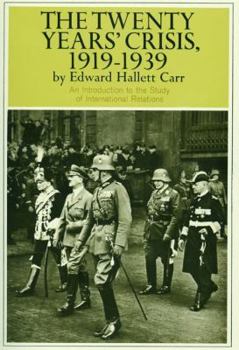Twenty Years' Crisis 1919-1939: An Introduction to the Study of International Relations
Select Format
Select Condition 
Book Overview
E. H. Carr's classic work on international relations published in 1939 was immediately recognized by friend and foe alike as a defining work. The author was one of the most influential and controversial intellectuals of the 20th century. The issues and themes he developed continue to have relevance to modern day concerns with power and its distribution in the international system. Michael Cox's critical introduction provides the reader with background information about the author, the context for the book, and its main themes and contemporary relevance.
Format:Paperback
Language:English
ISBN:0061311227
ISBN13:9780061311222
Release Date:March 1964
Publisher:Harper Perennial
Length:256 Pages
Weight:0.55 lbs.
Dimensions:0.6" x 5.3" x 8.1"
Age Range:13 years and up
Grade Range:Grade 8
Customer Reviews
4 ratings
Defence for realism and support for pluralism
Published by Thriftbooks.com User , 17 years ago
This book should be considered one of the `core' readings within the sphere of international relations, essential for any student of the subject. However Carr is not necessarily the diehard realist that he is sometimes made out to be. Despite being quoted by numerous texts as part of the realism school, Carr makes clear early on in his book that while he disagrees with pluralism and does a good job defending realism, he then goes onto state that firstly, pluralist theories go on to become realist ones and secondly, that pluralist theories are a necessary and essential element. An interesting observation, from which could be drawn the conclusion that there is no 'right' school of thought, simply revolving ideas and concepts. An insightful and interesting work, that should be required reading for anyone serious about international relations.
Good for Beginner of International Relations
Published by Thriftbooks.com User , 20 years ago
Honestly speaking, Carr's book is indispensable for student of international relations (IR), especially for the beginner who has not studied IR before. This book is written in a very clear manner by introducing basic concepts of IR such as liberalism (utopianism in the book), realism, international public opinion (morality), the nature of politics, the means of power, international law and dispute settlements. The main point of Carr is that student of IR should not ignore the empirical studies or follow some ideal norms which have not been testified or proved. By titling the book as Twenty Years' Crisis, Carr shows the reader that the international order was dominated by the ideal utopianism (Woodrow Wilson's approach) after the First World War. Since the diplomats and scholars at that time chose to trust the ideal norms or utopianism (harmony of interests, what is good for me, is good for you too), power politics was ignored, and the ambition of Hitler was interpreted as self-determination of ethnic groups. Besides, Carr argues that international order cannot be determined by utopianism alone, without power (super-state / final arbiter), conflicts and wars continue again and again. The fail of League of Nations and the disastrous Second World War are the cases of the deficiencies of utopianism. Carr's book is regarded as indispensable also because he introduces the concept of morality and hegemon. Carr's argues that the new international order should be maintained by hegemon who is responsible to be the final arbiter (economic or military means) of international conflicts. However, it does not mean that the hegemon can act according to its own interests and desires. Carr emphasizes that the hegemon should hold the principle of morality, humanity and equality. In other words, we should not only study power in realism, but also the means and end of power. In Carr's perspective, power is the means, peace is the end. If power is used, but peace is not the end, or even power is the end, then it will be a tragedy of international order. It is also worth to note that some predictions of Carr are correct such as the formation of great political and economic units / actors (European Union, NAFTA, ASEAN, MERCOSUR...), the declining importance of sovereignty and the rise of superpower. If you are interested in realism, you may read the following categories: Hans Morgenthau's classical realism, Politics Among Nations Kenneth Waltz's structural / defense realism, Theory of International Politics John Mearsheimer's offensive realism, The Tragedy of Great Power Politics
A very significant update with an excellent introdction, etc
Published by Thriftbooks.com User , 21 years ago
The work itself is too famous to be added with any non-professional accounts. This update, however, a very precious one in a sense, mainly because the fact that the author, E.H.Carr, did make a change from the 1st edition to the 2nd edition is lucidly explained. For some the change Carr had made is critical, since that was deeply concerned with his attitude on appeasement policy, especially the Munich Agreement in 1938. This is why M.Fox includes the both prefaces and his explanation on the difference as well as a well-written introduction to the work and others. I think this is a very important update we have been waiting for.
Classic
Published by Thriftbooks.com User , 25 years ago
I had to read this book for an International Relations class and it was excellant. I found myself deeply engrossed in Carr's depiction of the twenty years between 1919 and 1939What is really amazing is the fact that he wrote it before World War II and yet he predicted what would happen so well. I would recomend this book to everyone.






